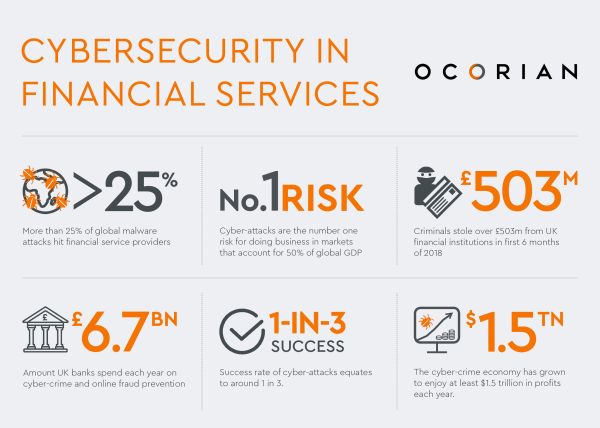With research suggesting that even in 2019, many companies have unprotected data and operate poor cybersecurity practices, Executive Director Charlotte Cruickshank examines the trends emphasising the importance of choosing a financial services provider that budgets, safeguards and educates staff against the latest threats.

As tech continues to evolve, so does the sophistication of cybercrime. In recent years, the actions of cybercriminals have intensified and the scale of their operations has been thrust into the media spotlight. Methods have changed too; cybercriminals do not solely seek financial gain anymore, but look to cause disruption, destroy data and in many cases, ruin reputations - somewhat unsurprising when you consider that the average age of a cybercriminal is 17.
With financial services companies processing large amounts of sensitive data and managing large cash balances, it is often they who face the heaviest waves of cyber-attack.
An evolving beast
We have seen a number of large-scale and successful cyberattacks in recent years. Well publicised in the press, the media have shone the spotlight on victims such as HBO, British Airways, Marriot, Facebook, Ashley Madison and most notably, the worldwide WannaCry attack in May 2017, which ravaged Britain's National Health Service (the estimated cost was around £92 million in cancelled appointments and subsequent IT upgrades).
Yet, as recognised by the IMF, it is the financial sector that is "one of the most targeted" - research published in April 2019 by cyber threat intelligence company, Intsights reported that more than 25% of all malware attacks hit banks and other financial services organisations, more than any other industry. This is echoed by global CEO sentiment, with cyber threats a top five concern for CEOs surveyed in PwC's Global CEO Survey 2018 and the top concern for CEOs in North America and the Middle East. Similarly, in Allen & Overy's 2018 survey 'Directors' Liability - D&O: Personal Exposure to Global Risk', it found that 44% of respondents confirmed they had experienced either a significant cyber-attack or a sizeable data loss in 2018.
A major issue is that solutions may only remain current and effective for a matter of months before the cyber-criminals work out a way to breach them. Typical cybersecurity threats of Ransomware, Phishing, Malware and social engineering are becoming increasingly sophisticated and difficult to defend against. As a result, financial services firms need to reinforce their vigilance on an increasingly regular basis, keeping up to date with the monitoring of threats and the availability of security solutions. There is no room for complacency.
A big price to pay
Companies that fail to take appropriate measures against the evolution of cybercrime put themselves at significant risk of an attack. Broadly speaking, cyberattacks cause disruption and damage that can be divided into three categories; financial, reputational and legal.
- Financial - A large proportion of cybercrime is related to fraud. For example, in the first six months of 2018, cyber criminals managed to steal more than £503m from UK financial institutions through authorised and unauthorised fraud. Although banks and financial services providers were able to prevent a reported £705.7m worth of unauthorised fraud over the same period, the success rate of attacks equates to around one-in-three.
- What is even more staggering is the £6.7bn UK banks spend every year on combatting cybercrime and online fraud - a figure that eclipses the UK Government's national prison system budget. Often alongside the immediate financial costs are the costs associated with the investigation of the breach and the repair of affected systems, networks and devices, whilst further investment should be made to upgrade implicated systems. Also, if the breach is financially significant, this can impact the liquidity and solvency risk of parties involved in transaction activity with the breached company.
- Reputational - Given the reliance of financial institutions and service providers on the trust of their customers, cyberattacks can have catastrophic implications on a company's reputation. Media coverage can swell in a matter of minutes and there can be severe knock-on effects for business partners invested in the business. With both public and investor confidence damaged, it can be several years before a business recovers.
- Legal - With the introduction of the General Data Protection Regulation (GDPR) for EU member countries in 2018, there is a legal obligation for companies to report breaches to supervisory authorities within 72 hours. Failure to fulfil this obligation is punishable by a fine up to 4% of global annual turnover or a maximum of EUR 20 million. GDPR laws also require that all personal data held is securely managed and if this data is accidentally or deliberately compromised, and there is failure to deploy appropriate security measures, fines and regulatory sanctions may be imposed.
An insider's view
Among a number of other trends, cyberattacks of the past 12 months can be characterised as being more targeted. So-called 'authorised push payments' are a form of phishing used to fool users into performing certain actions e.g. making payments to false bank details (resulting in financial or data loss). These could result in serious breaches of data, which would also result in significant reputational loss to our clients and Ocorian.
In recent times, we have seen impersonation of key individuals within our business, thus exploiting the trust we have within our own organisation. Any action or reply could provide them with sufficient information to perform a second, more successful attack.
We have also had similar experiences with our clients, where their emails have been hacked and invoices cloned. Ensuring that requests received over email are verified by telephone is now standard practise as a means of defence.
Fail to prepare, prepare to fail
As the cybersecurity landscape becomes more diverse and challenging than ever before, no organisation can say they are never going to be subject to a cybersecurity breach, they can only work to mitigate an ambush. This is proving increasingly difficult however, as businesses embrace the 'Internet of Things' (IoT).
The IoT continues to grow, enabling workforces to become more mobile, create new avenues to build value, share data and stay connected. Yet this diverse, flexible way of operating also opens up opportunities for information to be compromised.
It is a common misconception that cybersecurity is purely just an IT problem. Quite simply, it is not. All staff are in some way responsible for data security and internal leaks can be devastating. Businesses need to recognise that there are three key pillars to effective and robust cybersecurity. People, processes and technology.
Education is a critical component to employing a sound 'cyber hygiene' process. Even though cybersecurity is the responsibility of both the vendor of services and the service provider, it is also each and everyone's responsibility to treat with caution any information received or requested online.
Together with engendering an environment where it is welcomed that uncharacteristic or requests that raise suspicion are challenged, it is essential to develop strong working partnerships with your service provider. By working in a collaborative and transparent manner, this will mitigate cyberattacks as any deviation from the norm may be quickly identified, without the attack being successful.
The sharing of information about threats or potential threats should be encouraged. In their working paper: Cyber Risk for the Financial Sector: A Framework for Quantitative Assessment, the IMF recognises that there is "a material under reporting of successful cyberattacks in the financial sector". If they are to be successfully combatted, cyber threats should not be perceived as a weakness, but as a service whereby businesses can keep atop of potential breaches and protect against them.
Because of increased cybercrime activity, we may also see cyber insurance become more prevalent as part of a mitigation strategy. A good insurance policy will offer instant access to specialist counsel, network forensics services and crisis management consultants to help reduce the impact.
The Ocorian firewall
Our infrastructure team are fully prepared for these threats by ensuring systems are updated regularly, threat simulation tools are employed and relevant training for all employees is provided.
Our staff are kept abreast of the latest threats and the requirement to remain vigilant to the constant hazard of phishing in our workplace and personal lives. As the IoT and personal devices cross over with business, threats could migrate from one device to another or from business to personal devices. As this network perimeter expands, we understand the magnitude of risks and have adopted policies and procedures to help protect investors, investments, and ourselves.
With investment in new technology, we are constantly developing our operating model to ensure security in the flow of information across our global organisation and that information delivered to and from third party service providers such as administrators, lawyers and accounting firms is protected.
Originally published 18 June 2019
The content of this article is intended to provide a general guide to the subject matter. Specialist advice should be sought about your specific circumstances.

